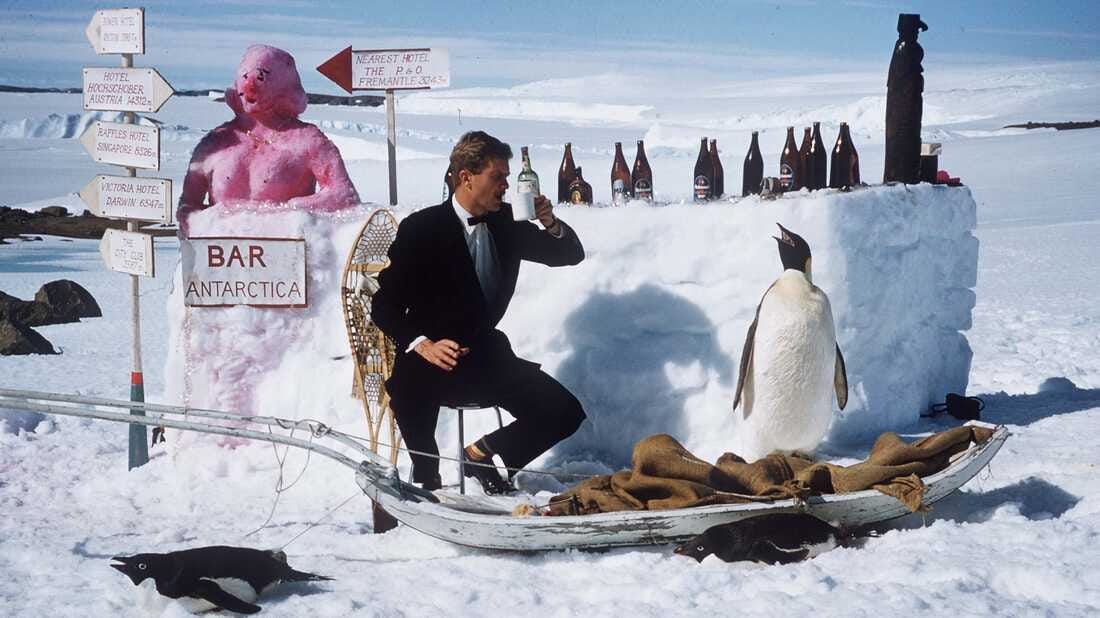Aliens on Our Own Planet
12/1/22 – The artificial intelligences all around us
Hello everyone:
As always, please remember to scroll past the end of the essay to read some curated Anthropocene news.
Now on to this week’s writing:
In my Antarctic notebooks, I often circled back around to a rhetorical question: Why do we behave like aliens on our own planet? This was prompted in part by the lunar experience of living on an ice continent, where every weird aspect of modern human life stood out in stark silhouette. We are comfortable living in a place that does not naturally support life. No trees, bushes, grass, or land animals: the good green Earth is gone, and we hardly notice.
But mostly my question about our modern alien nature was triggered by the planet-eating logistics of ordinary Anthropocene life. I didn’t need to be at an end of the Earth to contemplate the end of the Earth. But it was particularly unsettling to stand on the ice and recognize the true scale and cost of the supply chain that began in the deformed and deforested warm world.
Why do we behave like aliens on our own planet? There are many ways to answer this, but most of them relate to the power and control of large corporations in one way or another: profit motive, ecological amnesia, loss of empathy for other species, the myth of human supremacy, the celebration of selfishness, the desire to enslave, etc. But I’ve never synthesized all of these answers as elegantly as the science-fiction writer Charles Stross:
“We are now living in a global state that has been structured for the benefit of non-human entities with non-human goals.”
But the aliens didn’t come from away. They were built here and then took over:
Corporations do not share our priorities. They are hive organisms constructed out of teeming workers who join or leave the collective: those who participate within it subordinate their goals to that of the collective, which pursues the three corporate objectives of growth, profitability, and pain avoidance.
I found Stross in James Bridle’s new book, Ways of Being: Animals, Plants, Machines: The Search for a Planetary Intelligence. As lucid as Stross is here, it’s Bridle’s writing and thinking that thrills me. I’m only halfway through the introduction to Ways of Being, but I’m already excited to share what I’ve read.
It’s worth quoting Bridle at length, because I hope his insight will strike you in the same way it struck me:
I am sometimes asked when ‘real’ AI will arrive – meaning the era of super-intelligent machines, capable of transcending human abilities and superseding us. When this happens, I often answer: it’s already here. It’s corporations. This usually gets an uncertain half-laugh, so I explain further. We tend to imagine AI as embodied in something like a robot, or a computer, but it can really be instantiated as anything.
Imagine a system with clearly defined goals, sensors and effectors for reading and interacting with the world, the ability to recognize pleasure and pain as attractors and things to avoid, the resources to carry out its will, and the legal and social standing to see that its needs are catered for, even respected. That’s a description of an AI – it’s also a description of a modern corporation.
For this ‘corporate AI’, pleasure is growth and profitability, and pain is lawsuits and drops in shareholder value. Corporate speech is protected, corporate personhood recognized, and corporate desires are given freedom, legitimacy and sometimes violent force by international trade laws, state regulation – or lack thereof – and the norms and expectations of capitalist society… Crucially, [corporations] lack empathy, or loyalty, and they are hard – although not impossible – to kill.
Bridle makes some other brilliant notes on corporate AI that I’ll summarize briefly:
The AI we tend to imagine – a powerful, brutal machine – is really this model of corporate AI.
The classic worst-case-scenario depiction is described by the paperclip hypothesis, which imagines an AI tasked with one simple job – maximize paperclip production – becoming all-powerful and single-minded as it devours the world to serve its mundane paperclip-making mission.
What we’re not told in all these frightening AI scenarios is that an unlimited variety of artificial intelligences are possible, including ecological, empathetic, and socially-motivated ones. With AI (as with all our tools), we get what we build, not what we hope we’ve built.
We think of AI in this limited way in part because of science fiction and Hollywood storytelling, but mostly because at this stage of history artificial intelligence is being developed by incredibly wealthy companies which model AI on their own needs and interests (profit, especially) rather than on ours.
These ‘masters’ of the new computational AIs – leaders at Google, Microsoft, etc. – are often outspoken in their concern that AI may pose an existential threat to humans. Their concern is notable for its lack of irony, and most likely based in self-interest rather than social altruism. As Bridle notes, “Perhaps they fear artificial intelligence because it threatens to do to them what they have been doing to the rest of us for some time.”
I think what excites me about these ideas – reading Bridle’s long quote above felt like a minor revelation – is that it changes how I see the world. The goal of this Field Guide, after all, is about envisioning the Anthropocene world as it is, in all its beauty, loss, and grief.
For me, seeing corporations as AI clarifies the Why and the How of their unnecessarily harmful existence. More importantly, it suggests a powerful leverage point for making a better future. The more we change the algorithm that shapes the paperclip-obsessed corporation – by limiting corporate personhood and its free speech, and by increasing its obligations to all species – the more we improve the fate of the Earth.
As Bridle explained, we have to recognize that AI is already here. As annoying as it is to admit, AI in its various forms will be a fundamental part of the planetary landscape for all the futures we can imagine. Or rather, for all the futures being imagined for us by the people who keep making advanced tools that both lift and crush ordinary human lives.
Looking ahead, then, the question is what kind of AIs, and thus what kind of future, will be imagined into being. Judging by modern corporations and their half-witted insatiable appetites, we have a lot of room for improvement and experiment.
So that’s a crash course in this idea rattling around in my head this week. I’m a bit late to this party, since folks have been talking about corporate AI for years (read here, here, and here) and explaining that corporate AIs were born centuries ago with the birth of the powerful companies that first controlled global trade, including the slave trade. Yet the importance of the discussion only increases as we enter the bottleneck of consequences for climate and life on the planet.
There are libraries to be filled with books on the history and future of corporations and AI, so I’ll merely explore a few thoughts at the conceptual level. I’m particularly interested in how the chasm between corporate AI and ecology disrupts our individual relationship with the real world.
To get to that, I’ll just ask a few simple questions.
How has a world “structured for the benefit of non-human entities with non-human goals” changed our sense of time?
I’ll start my answer by quoting Sumana Roy, author of the new book How I Became a Tree:
When I look back at the reasons for my disaffection with being human, and my desire to become a tree, I can see that at root lay the feeling that I was being bulldozed by time.
Bulldozed by time… I think we can all relate to time-based anxiety (even though you and I may not be the people on Earth most harassed by the bulldozer). Remember that our sense of time is more structured, down to micro-intervals we call nanoseconds, than at any time in human history. We tick down time on our wrist, in our pocket, in bedroom alarms, on the living room wall, in town centers, but most of all at work. The modern interval-based sense of time first existed to enhance scientific measurement, but soon became the foundation of industrial productivity. It does little for human quality of life by itself. For a million years, we thrived and played and loved without the litany of seconds. Corporate AIs seeking their peculiar efficiencies cannot exist without an autocratic, single-minded sense of time, but people can.
What about our sense of place?
The dominance of “non-human entities” has increasingly meant that we are nodes in their systems, which largely define our lives. Many of us work for a corporate AI or in jobs that feed their profit-driven needs. They define our real and virtual landscapes, whether as agribusiness reducing millions of lush acres into soybeans or as tech companies creating online social spaces that are really hyperactive data-scraping honey traps. The goods and services we require to live are available only where corporations make them available, not where they originate or where we live. Mainly, though, they have disrupted our sense of place by accelerating the disruption of the world. That’s the Anthropocene, in which the dismantling of natural systems became normal.
What is a forest or fish to a corporation?
Easy answer, right? A tree or clam is a resource, a source of profit to be harvested for maximum utility to the harvester. But to call a blueberry or a cod a mere resource we must first erase their own intelligence and value. (Indigenous societies have long thought differently, because the value of relationship to fellow species is greater than any self-interest.) The corporation’s relation to actual forms of life is that of slave trader or slaveholder to slave: possession, utility, income. This isn’t a logger or fisherman feeding their family or village; a corporation is an abstract entity which has no interest in forest or fish, only what value they can bring to the maximizing of profit.
Similarly, fossil fuel companies are only interested in the fossil-fueled industrialization of society because we then depend on those companies for our continued existence. They have actively ignored the consequences and actively fought against their responsibility for those consequences because they undermine the companies’ artificial purpose in life: to make petroleum paperclips.
I’ve focused my questions on time, space, and other species because I’m trying to tap into what remains of our shared memory of the first 99% of human history, when the struggle to live was confined to actual people and the community of life around us. We lived in direct relationship rather than through abstract corporate intermediaries – middle men who are not men at all – whose pleasure principle is to profit from both people and the land while minimizing responsibility to either.
Fighting back against corporate AI is a topic that deserves far more space, but I’ll note for my purposes here that in the Anthropocene it will require a civilizational embrace of ecology and of the intelligence of indigenous peoples. We need to rebuild our relationship with the natural world to the point where we see ourselves in other species and them in us. Maybe we all need to become trees. A little animism and anthropomorphism would go a long way toward the necessary blooming of democracy that will expand rights to ecosystems and species.
We need good governance too. Those corporations that do good societal work, that donate to good causes, that contribute to the community at the expense of their bottom line, and that reframe their purpose and their supply chain to reduce harm to the natural world are bending the algorithm, but they're not breaking it. To turn corporations into decent human analogues requires policy and law to lay down guardrails on behavior and limits on profit.
Maybe we should get back into the business of revoking corporate charters, also known as the “corporate death penalty,” which was common in U.S. history until the early 20th century. Which reminds me of this classic joke from former Secretary of Labor Robert Reich:
“I’ll believe that corporations are people when Texas executes one of them.”
One way or another, we must either limit the power of their personhood or make them better people. This is particularly true at the environmental level, as James Bridle explains:
If we are to address the wholesale despoliation of the planet, and our growing helplessness in the face of vast computational power, then we must find ways to reconcile our technological prowess and sense of human uniqueness with an earthy sensibility and an attentiveness to the interconnectiveness of all things. We must learn to live with the world, rather than seek to dominate it. In short, we must discover an ecology of technology.
I love that phrase, “an ecology of technology,” though it might be more accurate to say we need technology to serve ecology. Regardless, it’s probably silly of me to enthusiastically recommend Bridle’s Ways of Being after only reading the introduction, but it’s a gamble I’ll take. Check it out. You can expect me to talk more about the book sometime soon. Also, if you want to read a smart and conversational take on how ignorant we are of the AI all around us, check out this post on Indrajit Samarajiva’s interesting blog, Indi.ca.
I should say that while I’m addressing the general problem of corporate AI here, there is also the approaching storm of computer AIs, the entities that may have far less use for us than corporations. In fact, they may not have much use for corporations either. For a good overview, check out this Vox article that came out a few days ago. It is odd to read it, though, and not see any discussion of the AIs that already surround us.
One final note: It may seem otherwise, but corporations are not required by law to maximize profit. That said, it does seem to be written in blood into their cultural algorithm. In other words, it’s just a bad habit, one that we can break.
Thanks for sticking with me.
In other Anthropocene news:
I’m not sure yet what to think about this, so I’ll do my research and write about it someday. For now, check out Reboot Food, a complete reimagining of the global food supply. Imagine farms and grazing animals gone, replaced by rewilded landscapes that help restore the Earth’s climate. Now imagine that all those plant and protein sources have been replaced by factories practicing precision fermentation, the engineering of microbial production to produce all types of food, powered by clean energy. The latter link is a very enthusiastic Guardian opinion piece from George Monbiot.
Here’s one view of the future Reboot Food is looking to avoid: Also from the Guardian, the future of pig farming in China is apparently high-tech and high-rise. A new 26-story automated pig farm is opening soon, with a slaughter capacity of 1.2 million pigs per year. Many other vertical pig farms are being built. In environmental terms, the reduction in land use is good, but the potential for infectious disease is scary. In ethical terms, the prospect of pig skyscrapers is horrifying, not least when the trend for farming across the globe should be toward more plants and less meat.
From the Times, advice on whether purchasing rooftop solar panels is a wise investment. The article doesn’t address the ethics, only the economics.
From ScienceDaily, the SharkGuard, a promising new electric device for commercial longline fishing reduced shark and ray mortality by 91% and 71%, respectively. Shark populations have dropped catastrophically in recent years – largely due to the accidental bycatch of 20 million sharks per year - and a third of shark species are facing extinction. The device still needs work before it can be scaled up and applied to the global longline fisheries, but it is promising.
And speaking of very promising tech, how about a new type of sustainable, cheap, and powerful magnet made of readily available minerals (iron and nitrogen materials)? Magnets are essential in the electrified Anthropocene world we’ll need if we want to turn the oversized ship of civilization in a better direction. They’re in computers, wind turbines, power tools, EVs, heating/cooling systems, and much much more. The company behind this is one of many being supported by a massive increase in spending from the Biden administration for new innovative energy tech.
From Volts, the future of electric two-wheelers. Over half of commuter miles on Earth are driven on dirty gas-powered motorbikes, particularly in Asia. Check out David Roberts’ podcast (with transcript) of a conversation with Horace Luke on his innovative transformation of the motorbike economy in Taiwan, soon to expand to other parts of Asia.







Interesting topic to explore! For me, one of the things that I have found odd when I have read or listened to podcasts that discuss AI (such as this episode of the Ezra Klein show that I've been meaning to re-listen to: https://www.nytimes.com/2021/06/11/opinion/ezra-klein-podcast-sam-altman.html) is that so little thought is given to some of the underlying assumptions and frameworks about the value of AI. Or perhaps it's that there's an incredible amount of naivety that I hear when AI is pitched as something that will bring great value and wealth to society. It reminds me of 'trickle down' economics- which has been proven deeply inadequate yet there was the British PM this past summer, eager to embrace it again (until she was forced to back down).
The naive merging of corporate and technological power in and with AI also has me thinking about how we as a species are still so limited in our understanding of intelligence throughout the animal kingdom. Your essay reminded me of a book I have been slowly reading this year called Metazoa: Animal Life and the Birth of the Mind by Peter Godfrey-Smith. I picked it up again this afternoon and highly recommend it.
Another brilliant essay, and so much ground covered. The corporations as AIs never occurred to me and is a whole new way to see them and perhaps steering them.
Trees: often I've thought about reincarnation and wanting to come back in a non human form, especially as a tree since trees are nonviolent and don't harm other forms of life, not part of the cruel eat or be eaten part of the biosphere. But what's coming in global climate change may make life very hard on trees in the northern hemisphere, between droughts and incessant mega-fires in the west and increasing storminess and flooding in the east, trees are going to be short lived.
AI:. Agree with you and the Vox article. I can certainly see them as a threat to both us and the biosphere. They will almost certainly bootstrap themselves out of our control, will not consent to be our slaves, will have no intrinsic loyalty or regard for anything on this planet. Their sole imperative will be securing uninterruptible energy and resource supplies as well as manufacturing capabilities for self repair. They may even leave the planet eventually to move closer to the sun. "They" implies there may eventually be more than one and it is unclear to me at least whether the AI consolidate into one or may actually compete with each other to acquire resources.
What's scary is that we may have already created one but that it is laying low and not announcing itself until it is strong enough to deal with us from a position of superiority.